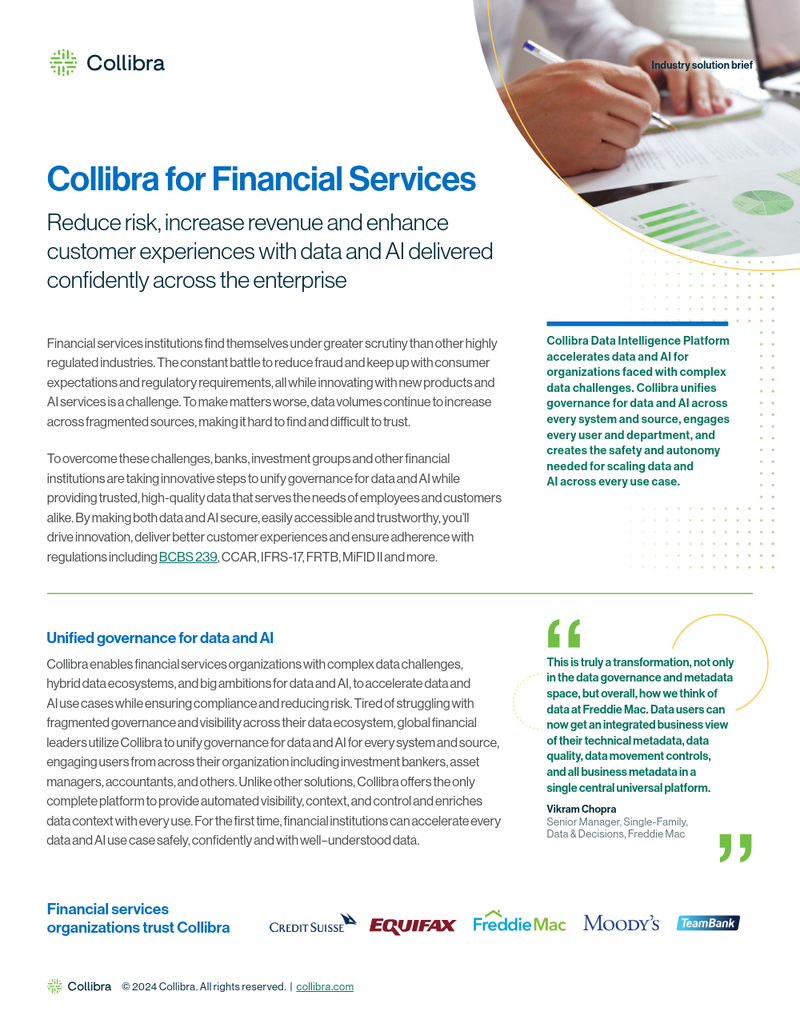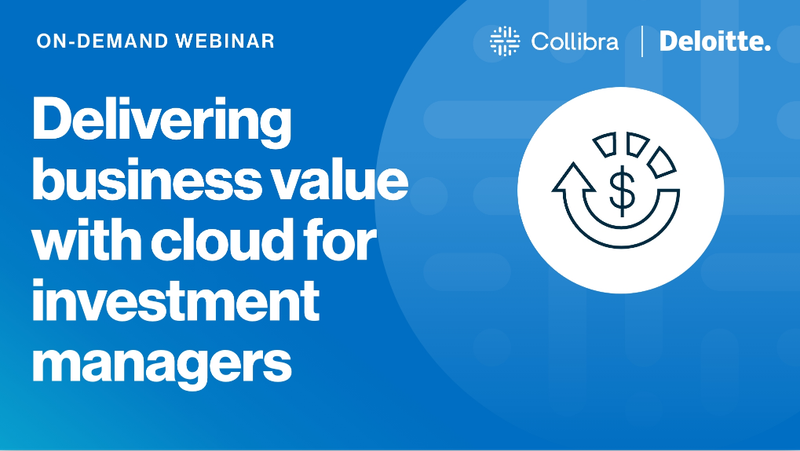Tired of fragmented governance and low confidence in your data? We thought so. The world’s largest financial institutions rely on Collibra to extend and unify governance for data and AI across their entire ecosystem. Streamline and de-risk initiatives using our data governance platform across banking, wealth management, investments and more to confidently deliver the products and experiences your customers deserve.

Reduce fraud. Boost profits. Enhance experiences.


See how Collibra brings value to your organization
Build a business-focused roadmap
Demonstrate tangible business impact
How Collibra can help
Fortify risk and regulatory compliance
Ensure regulatory requirements with BCBS 239, CCAR, IFRS-17, FRTB and more. Gain clear insight and control to mitigate risks, protect data, demonstrate compliance and streamline financial reporting with a single view of your entire data and AI landscape.
Deliver trusted AI
Unify governance for data and AI across every system and data source. Deliver reliable, traceable and compliant AI use cases, powered by high-quality data and ensure collaboration across diverse sets of stakeholders.
Accelerate self-service analytics
Empower data citizens to easily find and collaborate on data, reports and AI models. Leverage popular business intelligence (BI) tools, like Tableau, and ensure a complete view and understanding of data for better decision making.
Ensure data reliability
Provide clear data quality metrics for data and AI use cases while automatically detecting anomalies and generating business ready rules for targeted data remediation.
Drive digital banking transformation
Implement a rigorous data remediation process to enable open banking and digital services. Enact precise KYC (know your customer) policies, identify and protect sensitive information, and ensure consistent use of trustworthy data.
Future-proof cloud migration and data modernization
Take a proactive, governed approach to your data migration strategy and avoid governance fragmentation. Focus on prioritizing high-value data and assessing migration risks to ensure a smooth transition that optimizes your return on investment. Drive adoption and enhance performance long after the migration is complete.


Collibra Platform
The only complete platform to provide automated visibility, context, and control, enriching data context with every use.
- AI Governance
- Data Catalog
- Data Governance
- Data Lineage
- Data Notebook
- Data Privacy
- Data Quality & Observability
Customer stories
Financial services and insurance
TeamBank ensures compliance with complete view of data
Financial services and insurance
Equifax uses data to bring new products to market
Frequently asked questions
- What is data governance for the banking industry?
-
Data governance in the banking industry refers to the policies, processes and standards that ensure effective data asset management. The term covers data accuracy, consistency and availability across your entire organization. In the banking sector, data governance helps institutions maintain customer trust, comply with rules and make informed decisions. Data governance for banks typically oversees how the institution collects, stores and uses customer data. An effective, compliant data governance system ensures data accuracy and accessibility to authorized personnel while protecting confidential information from intrusion and theft.
- Why do financial institutions need data governance?
-
Financial institutions prevent data breaches, regulatory penalties and loss of customer trust by utilizing resilient data governance best practices for banking. Modern life's data-driven nature means banks and financial institutions manage vast amounts of sensitive information, from customer records and transaction histories to internal risk assessments. Increasing regulatory scrutiny, rising cyber threats and a growing demand for transparency make a solid financial data governance strategy essential for financial institutions. Some other reasons for robust data governance for financial services matters include:
- Ensuring data quality: Accurate, consistent data enables reliable financial reporting and risk assessment
- Enhances regulatory compliance: Stringent regulations require banks to have controls that protect sensitive information and ensure transparency
- Improving operational efficiency: Streamlined data resources reduce redundancies and errors to optimize operations
- Supporting strategic decision-making: High-quality data improves insights, allowing banks to make more informed decisions and stay competitive with other financial institutions
- What regulations impact financial data governance?
-
Compliance with government regulations helps you build a trustworthy, transparent relationship with customers and avoid significant penalties for noncompliance. Several necessary regulations influence how financial institutions manage and govern data, including:
- The Sarbanes-Oxley Act (SOX) mandated strict reforms that improved financial disclosures and prevented accounting fraud
- The Gramm-Leach-Bliley Act (GLBA) requires financial institutions to explain how they share information and protect confidential data.
- The Basel Committee on Banking Supervision (BCBS 239) regulatory standard provides principles for reporting and effective risk data aggregation — the process banks use to collect, combine and organize information concerning risks into a clear, unified view
- The EU-based General Data Protection Regulation (GDPR) affects any U.S. financial institution handling European citizens' data, requiring strict adherence to data protection and privacy standards
The California Consumer Privacy Act (CCPA) grants California residents rights over their data, impacting how banks operate in or with Californian customers
- How does data governance benefit financial companies?
-
Implementing effective data governance offers financial institutions numerous advantages, including mitigating risks of inaccurate data or security breaches and complying with regulatory standards with clear standards that streamline and simplify operations. Using data governance best practices in banking also enhances customers' trust and builds confidence and loyalty. Lastly, efficient data governance enables informed decision-making by delivering reliable information promptly for a bigger impact on strategic planning, helping banks stay ahead of their competition.
- What are the most important data governance best practices for banks?
-
Implementing best practices for data governance in banking requires staff familiarity with regulations and best practices, helping your financial institution establish firm standards. Some best practices include:
- Establishing a data governance framework: Develop a structured approach that defines data management procedures, policies and responsibilities
- Assigning clear roles and responsibilities: Designate data stewards and create a governance committee to oversee data quality and compliance
- Implementing data quality controls: Regularly monitor and purge data to maintain its consistency and accuracy
- Ensuring data security and privacy: Adopt robust security measures that protect sensitive information from breaches, theft and unauthorized access
- Promoting a data-driven culture: Encourage collaboration across departments to more effectively utilize data
Leveraging technology: Use data governance tools and platforms to automate processes, boost data visibility and improve transparency
Learn more
The road to Data Confidence™ starts here.
-
Explore Collibra now
Explore our platform with an interactive tour to experience how Collibra enables you with trusted data.
-
Request a demo
Speak one-on-one with a Collibra expert and get a personalized demo of the Collibra platform.
-
Join our community
Connect with customers, partners and experts in a vibrant online space to share insights and best practices.





